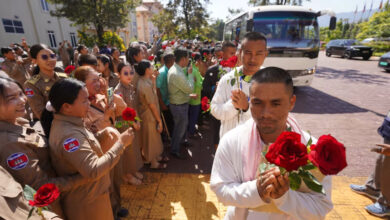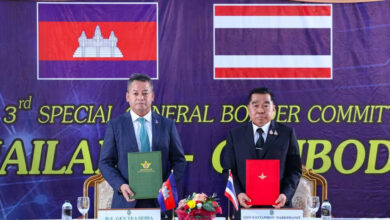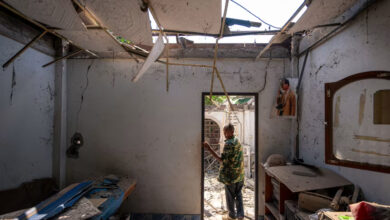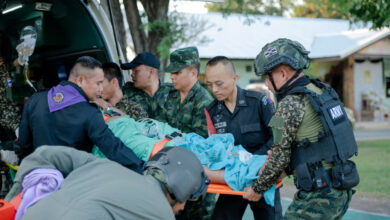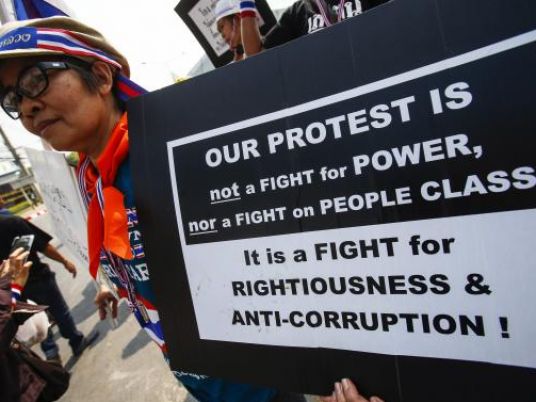
Thailand's Election Commission urged a delay in next week's planned national vote, warning on Monday of more bloodshed after violent clashes at the weekend.
That would drag out a festering crisis that risks splitting the country. The military, which has often stepped in to take control in the past, is resolutely staying out of the fray this time, despite appeals from anti-government protesters.
"As election officials, it is our job to make sure elections are successful, but we also need to make sure the country is peaceful enough to hold the election," Somchai Srisutthiyakorn, an Election Commission member, told Reuters.
"We don't want it to be bloody."
The commission will meet embattled Prime Minister Yingluck Shinawatra on Tuesday to discuss the vote date.
With protests aimed at toppling Yingluck now in their third month, there has been repeated speculation that the armed forces might try a repeat of the 18 actual and attempted coups they have mounted in 80 years of on-off democracy in Southeast Asia's second biggest economy.
But in comments to reporters, armed forces supreme commander, Thanasak Patimapakorn, refused to be drawn on whether elections should be postponed.
"The Election Commission and the government will meet to discuss this tomorrow. Soldiers will not be able to say much more than this," he said.
However, the military in recent weeks has also refused to rule out intervention.
The Election Commission says the months of protests render the country too unstable to go to the polls on February 2.
That argument was bolstered by the shooting on Sunday in Bangkok of a protest leader, taking to 10 the death toll since the protests started in November.
The protests, centered on the capital, have broad support among Bangkok's middle class and the traditional elite.
They are pitted against the mostly rural, and much larger, voting block in the country's north made up of so-called "red shirt" supporters of Yingluck and her ex-premier brother Thaksin Shinawatra, forced out of office by a military coup in 2006.
Thaksin lives in self-imposed exile to escape a 2008 jail sentence for corruption.
Red shirt leaders have threatened to descend on the capital again if the military steps in. At least 90 people were killed in street fighting in Bangkok in 2010 between troops and the red shirts.
NOT BACKING DOWN
In their latest comments, neither the government nor the protesters showed any sign of backing down.
"We have to press ahead with the February 2 election … A postponement would be futile and would only give independent organizations more time to target the government," Interior Minister Jarupong Ruangsuwan, also head of the ruling Puea Thai Party, told Reuters.
Last week the government declared a state of emergency that would give it sweeping powers to curb the protests using the police, but it has so far shown no appetite for a crackdown and the marches through the capital have continued.
On Sunday, protesters closed off most of the polling booths set up in Bangkok for advance voting, though the Election Commission said voting went ahead in 292 of the 375 electoral areas nationwide.
Yingluck called the February 2 election in the hope of confirming her hold on power, and would almost certainly win by a large margin.
Protest leader Suthep Thaugsuban, a former deputy prime minister, has rejected the election outright. In a speech to demonstrators on Sunday night he appealed to the military to "protect innocent people who fight with their hands".
On Monday, he said his "Bangkok Shutdown" movement would not accede to government requests to free up access to ministries and state agencies that they have blockaded.
About 2.16 million people have registered for early polling in the country, out of 49 million eligible voters.
Election official Somchai said even a delay of one month might not be enough to resolve the political deadlock, but waiting too long would leave the caretaker government unable to administer the country properly.
He said the commission did not agree with protesters' plans for an unelected "people's council" to take over the government.
"This is not the democratic way of doing things … I don't think Suthep's reforms, within the time frame he gives, are possible."
EIGHT YEARS OF CONFLICT
The protests are the latest chapter in a political conflict that has gripped Thailand for eight years. There is growing talk it could turn into civil war and draw in the military.
Paul Chambers, director of research at the Institute of South East Asia Affairs in northern Chiang Mai, said Thailand might have to settle on a decentralized form of administration, with different regions given broader sway to pursue their own policies.
Sunday's killing, Chambers said, reflects "the growing tit-for-tat" between the two sides.
"It is a dangerous trend, a harbinger symptomatic of the potential inception of civil war — or a future clash between police and army that could lead to a coup," he said.
"There are growing perceptions among people on each side that to avert civil war it might be necessary to regionally decentralize Thailand such that there is one country, two democracies … united only under the Kingdom of Thailand."
Yingluck's government led the country through a relatively peaceful period between 2011 and 2013 until a misstep by her Puea Thai Party in November, when it tried to force through an amnesty bill.
That would have let her brother return as a free man, despite the 2008 jail sentence that he says was politically motivated.

